Any brand that relies on field sales teams to generate new business knows the importance of efficiency and relationship building. Wasted time traveling between accounts or frantically trying to remember what you did at your last visit only slows down reps’ ability to close more deals.
So what’s a manager to do to help their reps sell more? Enter agile field sales!
This sales technique is more about organization than actual selling best practices. By enabling reps in the field to maximize their productivity, they’re able to touch more accounts and make more meaningful connections throughout the workday.
Agile field sales incorporates a few fundamental elements, namely:
- Standardizing tasks performed at each store visit
- Instantly accessing client histories
- Streamlining transit between accounts
- Tracking employee performance that’s backed by data
As a manager, you’ll benefit from these principles in the following ways:
- Ensuring reps are doing the right work at the right accounts at the right time
- Giving reps the power to always be informed about the specifics of an account
- Greatly reducing rep inefficiency on the road
- Improving precision in measuring team and individual success
In this post we’ll go over how to build to an agile field sales organization that’s founded on standardization and data-driven insights.
Optimize Reps’ Workday With Account-Centric Tasks
A growing team has the power to reach more accounts, but also has the tendency to let process fall by the wayside. Here’s where task assignment comes in handy. Instead of simply hoping that reps are consistently meeting with the correct buyer, checking up on stock levels, or advertising your latest promo, an agile field sales team makes required tasks part of their regular workflow - and with the right mobile CRM, you can quickly see which have been completed and which are still left to do.
Beyond single to-do items, assigning tasks through a mobile CRM gives sales managers some control over the cadence and process their team executes in the field. For example, you could add a merchandising check to every other account visit, a task to check stock levels once a month, and a semi-annual SKU update. By setting these tasks as mandatory, and scheduling and assigning them in bulk, sales managers can quickly introduce new processes to even the most disperse teams.
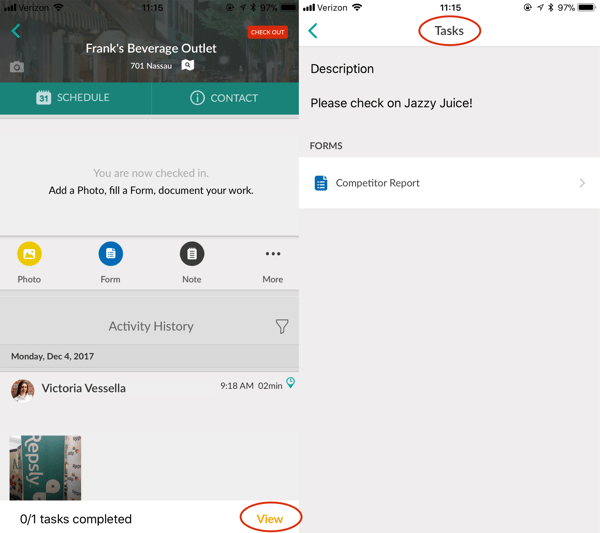
Help reps make the most of every visit with assigned tasks for specific accounts.
Enhance Account Relationships Using Mobile CRM
Now that we’ve established the importance of standardizing the sales process, let’s talk about ways to enhance that process by forging lucrative relationships with your retail accounts.
You can’t possibly work better with retailers if you don’t know them. Again, forms come in handy for documenting anything you’d want reps to know about an account when they’re on-site. You might build a form that captures demographic information, the retailer’s knowledge and interest level of your products, product placement in the store, the retailer’s willingness to allow promotions and in-store displays, among other areas of interest.
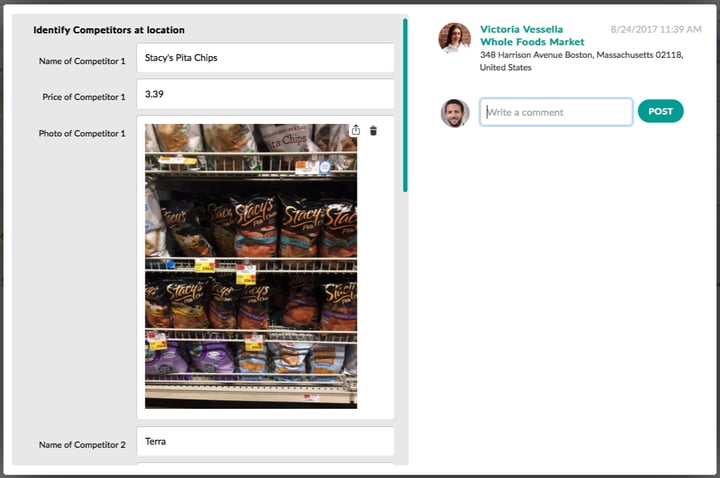
Have reps document need-to-know data points about their retail accounts while on-site during a visit.
But what good’s all this data if reps don’t do anything with it? Here’s where mobile CRM comes into play. Need to know the last time a replenishment order was placed, or if the usual buyer is away on vacation? Maybe a rep needs a refresher on how successful the last promotion was before negotiating for a new one. Or perhaps the s/he can’t remember if they gave the buyer a sample of your newest flavor yet.
Empowering reps with on-the-go access to information about previous account visits lets them tailor each appointment to best suit that retailer. Running shoe brand Altra was able to increase meaningful in-store interactions and driven sales at each account location by 10% using this method!
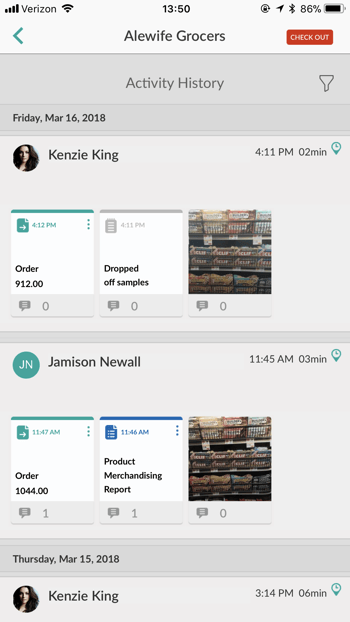
Enable reps to strengthen relationships with their accounts by having instant access to information about past visits.
Boost Productivity With Scheduling Efficiency
We know that having a productive account visit is important, but what can you do as a manager to increase the volume of those visits each day? Start by making sure that reps are taking the most efficient possible route between each stop.
Equipping them with GPS will let you see inefficiencies in the day-to-day that can be improved on. L.A. Libations, for example, was able to double the amount of visits that reps make while cutting mileage in half!
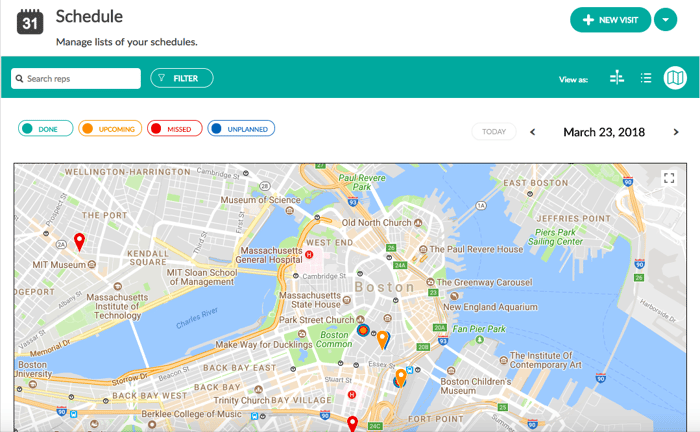
Design optimal transit routes for reps who spend most of their workday on the road.
Taking it a step further, give reps a way to make unplanned visits to new accounts should interruptions occur during their day. When a client or prospect unexpectedly cancels, the rep is usually left with few options for what to during that time frame before they need to move on to the next visit. Don’t let this time go to waste by using a tool that can suggest nearby client recommendations based on the rep’s location.
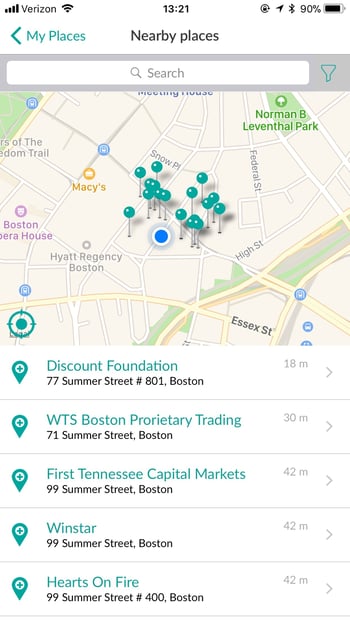
Limit wasted time from unexpected interruptions during the day by giving reps a way to find new leads while they're already out on the road.
Provide Targeted Feedback Based on Data-Driven Performance History
The last piece of the puzzle in an agile field sales system is to be constantly improving. It’s hard to define what exactly a rep or entire team needs to work on if there’s no traceable history of what’s going on in the field, or if what’s being tracked isn’t organized into measurable metrics.
To remedy this, managers can develop key performance indicators (KPIs) that flag who’s going the extra mile and who’s lagging behind. Examples of KPIs for a field sales team include:
- Selling in new SKUs
- Adding a secondary placement
- Adding additional facings
- Relocating products to the desired store department
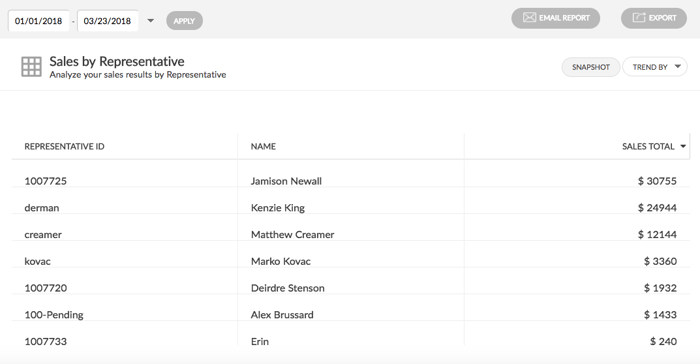
Coach reps using actionable data about their performance.
Besides just using KPIs for coaching purposes, managers can offer performance-based incentives for reps and teams based on data that’s being analyzed from the field. Organic snack company Barnana does this by identifying how many shoppers their field marketing team interacted with, how many bags they sold, which flavors sold best, and which reps managed to get a secondary placement while they were at the store.
Next Steps
Disruptive brands know the value of a data-first sales force. What’s more, they do everything in their power to eliminate ineffective workflows that stifle productivity. Agile field sales helps managers lead their team more effectively and allows brands to scale faster than they normally would.
Ready to make agile field sales part of your team? Chat with one of our Repsly specialists to learn about our best-in-class forms, team scheduling, route optimization, and more.










